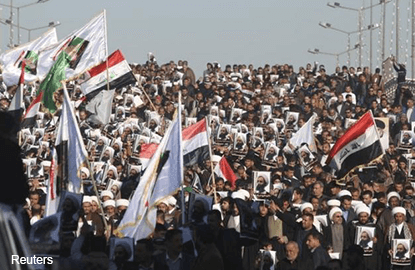
This article first appeared in The Edge Financial Daily, on January 6, 2016.
SAUDI Arabia and Iran started the new year by reigniting an old feud. The challenge for the rest of the world is not to let their recklessness lead to an even broader Sunni-Shi’ite conflict across the Middle East.
The latest crisis started on Saturday, when the Saudis executed a prominent Shi’ite cleric, Nimr al-Nimr, along with several dozen convicted al-Qaeda terrorists. The Iranian regime — which itself put nearly 700 people to death in the first half of 2015, according to Amnesty International — swiftly condemned the execution, and crowds in Tehran stormed the Saudi embassy. On Sunday, Saudi Arabia ordered the Iranian ambassador out of the country.
It is important to note that the Saudis’ main audience here is domestic. As low oil prices and a giant deficit have forced the government to raise taxes and cut gasoline subsidies, it is not going to brook any public disturbance. King Salman, on the throne just a year now, likely is still consolidating his power.
At the same time, there is a broader context to keep in mind. The Saudis undoubtedly fear that Iran wants to take leadership of a pan-Shi’ite bloc across the Middle East to challenge long-standing Sunni dominance. They are right. And then there is the nuclear deal reached last year between Iran and Western powers, which has the Saudis worried that their long time US allies may be changing horses.
The Saudis are also concerned about talks among the US, Russia and Iran to end the Syrian civil war, which seem certain to leave their sworn enemy — Syrian leader Bashar al-Assad — in power for the short term.
No one should be under any illusions about how easy it will be to get the Saudis to moderate their views or change their behaviour. But there are a few points to make. The main one is that, rather than trying to stamp out domestic unrest with fundamentalism, they would do well to diversify their economy away from total dependence on volatile oil markets.
They also need to ensure that the main burden of recent belt-tightening falls on the super-wealthy, rather than the middle class; continue their embryonic attempts at local political liberalisation; and end institutionalised discrimination against Shi’ites.
The White House has a few carrots to use with the House of Saud. While threatening to cut off scheduled arms sales would be a mistake, it could make future contracts for weapons the Saudis covet — precision bombs, air-defence systems and attack helicopters — contingent on Saudi efforts to ease regional tensions. The US should also encourage, and pledge to provide technology for the creation of a shared missile-defence system among the Gulf Arab states to deter Iran.
For his part, President Barack Obama cannot look the other way at Iranian breaches on unrelated matters such as conventional missiles and human rights. That simply fuels Saudi distrust, encourages the Iranian regime to see what else it can get away with, and gives critics in Congress and the Middle East more impetus to blow up the nascent deal.
In a more sensible world, the shared fight against Islamic State might have led to broader regional cooperation and an easing of Muslim sectarian rivalries. That now seems a faint hope. The more urgent priority is for the US and its allies to focus on keeping things from getting worse. — Bloomberg View